Table of Contents
- Introduction
- Kava vs Alcohol: What’s the Difference?
- Kava as a Replacement for Alcohol
- Kava for Sleep: A Natural Nightcap?
- What Does Kava Feel Like?
- Safety & Interactions
- Conclusion
- FAQs
Introduction: Ditch the Booze, Embrace the Roots
Let’s paint a scene you’ve had a long week, your nerves are frayed, and the weekend calls. Traditionally, this means cracking open a cold beer, pouring a glass of wine, or mixing your go-to cocktail. But what if you're craving that same relaxed vibe without the hangover, brain fog, or guilt?
Alcohol Substitutes:
Welcome to the rise of alcohol substitutes and leading the pack is kava, a calming root-based drink making waves as a wine replacement, a healthier alcohol alternative, and even a natural aid for sleep and anxiety.
Today, we’re diving deep into this trending tonic to answer a burning question, Is kava really a safer, healthier, and effective alcohol replacement? Let's explore.
Key Takeaways of This Blog
- Kava is a natural, non-alcoholic beverage from the Pacific Islands known for its calming effects.
- It’s increasingly used as a substitute for alcohol for socializing, stress relief, and even better sleep.
- Unlike alcohol, kava doesn’t impair judgment, damage the liver (in moderate doses), or lead to addiction in the same way.
- There are best practices, risks, and benefits to know before swapping your evening wine for a kava brew.
- We’ll also unpack common questions like, “Does kava show up as alcohol?” and “Will I sleep better without alcohol?”
- Kava vs Alcohol: What’s the Difference?
Kava vs Alcohol
Kava is prepared by grinding the root of the Piper methysticum plant and mixing it with water to create a beverage. The active compounds in kava, known as kavalactones, interact with the brain's neurotransmitters to produce calming effects without impairing cognitive function.
Alcohol: The Traditional Choice
Alcohol, on the other hand, is a central nervous system depressant that affects various neurotransmitter systems, leading to relaxation, lowered inhibitions, and, at higher doses, impaired motor skills and judgment.
Comparative Analysis
|
Aspect |
Alcohol |
Kava |
|
Psychoactive |
Yes |
Yes |
|
Impairment |
High |
Low to moderate |
|
Addictive Potential |
High |
Low to moderate |
|
Liver Toxicity |
Yes (well-documented) |
Rare and only with excessive or poor-quality use |
|
Legal Status |
Regulated |
Legal in most countries, but varies |
|
Sleep Effects |
Disruptive |
Can promote deep sleep |
While both substances can promote relaxation, kava offers a more balanced approach, providing calmness without the cognitive impairment associated with alcohol.
Can Kava Replace Alcohol?
If you're looking to cut back on alcohol or even eliminate it entirely, you might be wondering whether there's an alternative that offers similar benefits, without the downsides.
Natural Beverage:
Natural beverage containing kava like Goldenglow, is quickly becoming a popular choice for those seeking a relaxing, alcohol-free option to wind down, manage stress, or enhance social experiences.
Kava’s calming, mood-lifting properties make it a great choice for social situations, allowing you to feel relaxed and at ease, without the brain fog, hangovers, or negative side effects that often accompany alcohol. Whether you're looking for a healthier way to unwind after a long day or just want to enjoy a night out without drinking, kava could be the answer you've been searching for.
Forms of Kava
Kava comes in several convenient forms, each offering a unique way to experience its benefits.
Best Practices for Using Kava as an Alcohol Alternative
To get the most out of your kava experience and ensure it’s a safe and enjoyable replacement for alcohol, here are some best practices to follow:
Select Noble Kava Strains:
Not all kava is created equal. Noble kava strains are considered the safest and most effective. They’re known for their mild, relaxing effects without the adverse side effects that can sometimes be associated with lower-quality kava.
Start with Low Doses:
When trying kava for the first time, it’s important to start with a low dose and assess how your body reacts. This way, you can avoid potential discomfort and determine the right amount for your needs.
Avoid Mixing with Alcohol:
While kava is a great alcohol replacement, mixing it with alcohol can be risky. The combined sedative effects could lead to excessive drowsiness, impaired judgment, or other unwanted side effects. Stick to one or the other to enjoy kava safely.
By following these guidelines, you can enjoy all the relaxing benefits of kava without the negative side effects of alcohol. Whether you're trying to reduce alcohol intake or simply looking for a healthier way to relax, kava offers a natural, calming alternative.
Kava for Sleep: A Natural Nightcap?
Kava's Role in Sleep Enhancement
For centuries, kava has been valued not just for its relaxing properties, but also for its ability to promote better sleep. Unlike alcohol, which can disrupt sleep patterns and leave you feeling groggy the next day, kava helps ease the body and mind into a restful slumber. Its calming effects are particularly beneficial for those struggling with anxiety or stress, both of which can interfere with falling asleep. By reducing those racing thoughts and tensions, kava sets the stage for a peaceful night’s sleep without the disruptions commonly associated with alcohol.
Comparing Kava and Alcohol for Sleep
While alcohol may help you fall asleep faster, it often comes at a cost. Many people experience fragmented sleep, waking up multiple times throughout the night, or feeling unrested due to the lack of deep REM cycles. Alcohol essentially numbs the body, preventing it from reaching the restorative stages of sleep. Kava, on the other hand, works differently. It helps facilitate a deeper, more restorative sleep cycle, ensuring that you wake up feeling more refreshed and with fewer groggy moments.
Unlike alcohol, which can cause disruptions in your sleep architecture, kava nurtures a natural sleep experience, helping your body stay in the restful state for longer periods. This makes it a superior choice for anyone seeking a natural solution to sleep difficulties, without the side effects.
Incorporating Kava into Your Routine
If you’re considering using kava as a sleep aid, timing is key. For optimal results, it’s best to consume kava about 30 to 60 minutes before bedtime. This gives the kava time to take effect and gently guide your body into a relaxed state, ready for sleep. However, as with any supplement or natural remedy, it’s always a good idea to consult with a healthcare provider before adding kava to your nightly routine, especially if you have underlying health conditions or take medications.
By incorporating kava into your routine, you can enhance your sleep quality naturally and wake up feeling more rejuvenated, without the harsh effects of alcohol.
What Does Kava Feel Like?
The Kava Experience
When it comes to kava, people’s experiences can vary, but there are some common effects that most users report. Generally, kava’s effects are described as:
Mild Euphoria:
A sense of well-being and happiness that promotes relaxation. Kava helps you feel at ease, without the over-the-top sensations that alcohol might induce.
Relaxation:
Kava works wonders in calming both your body and mind. Many users note a reduction in muscle tension and mental chatter, which can help them unwind after a stressful day.
Sociability:
Kava has been known to enhance social interactions, making you feel more open and comfortable in social settings. Unlike alcohol, which can sometimes lead to overly uninhibited behavior, kava encourages sociability without compromising your clarity or control.
Comparisons to Other Substances
What’s interesting about kava is that its effects are often compared to those of mild anti-anxiety medications, without the addictive potential or the major side effects. Unlike alcohol, which impairs cognitive functions and can lead to loss of inhibition, kava allows you to stay clear-headed while still experiencing its calming benefits. This makes it an excellent choice for people looking for a natural way to relax without the impairment that often accompanies drinking alcohol.
Kava provides a more subtle, less disruptive effect compared to alcohol, which can leave you feeling mentally foggy or even out of control. Instead, kava gives you a gentle, calming experience that keeps you grounded and in touch with your surroundings, while still providing the relaxation you’re seeking. It’s like a mental reset without the fog.
Safety & Interactions;
Is Kava Safe?
When sourced from reputable suppliers and consumed responsibly, kava is generally safe for most individuals. It has a long history of use in Pacific Island cultures, where it has been valued for its calming and social effects. However, like any supplement, it’s important to exercise caution. Excessive consumption or using non-noble kava strains which are lower in quality has been linked to rare cases of liver toxicity. This is why it's essential to choose kava products that are made from noble kava strains, as they are considered safer and less likely to cause harm.
To minimize the risks associated with kava consumption, always adhere to recommended dosages and avoid overuse. Moderation is key, just as it would be with any substance, whether it's alcohol, caffeine, or herbal remedies.
Interactions with Other Substances
One of the most important safety considerations with kava is its interaction with other substances. Kava is a sedative, meaning it promotes relaxation and reduces anxiety. If you combine kava with other sedative substances, such as alcohol, benzodiazepines, or sleep medications, you might experience amplified effects. This can lead to increased drowsiness, impaired motor skills, and heightened risks of accidents or adverse reactions.
Therefore, it’s best to avoid mixing kava with alcohol or other sedative medications unless approved by a healthcare professional. Always err on the side of caution and consult a healthcare provider before combining substances.
Legal Status
Kava's legal status varies by country. In many countries, including the United States and Australia, kava is legal and widely available for purchase. It is often sold in health food stores, online, and in specialty shops that focus on natural remedies. However, some countries have imposed restrictions or even bans on kava due to past concerns about its potential to cause liver damage when consumed improperly. These concerns have led to strict regulations in places like Canada and certain European nations.
If you're traveling or planning to buy kava abroad, it's a good idea to check the local laws to ensure it's legal in your location. Despite past controversies, when consumed responsibly and sourced from trusted suppliers, kava remains a safe and effective choice for relaxation.
Conclusion: Embracing a Healthier Alternative
Kava presents a compelling and natural option for those looking for an alternative to alcohol. Its calming effects, minimal side effects, and potential to improve sleep make it an attractive choice for individuals aiming to reduce alcohol consumption or simply explore new ways to relax and unwind. Whether you want a healthy nightcap or a way to socialize without the hangover, kava offers a balanced approach to relaxation.
As with any supplement, informed caution is essential when incorporating kava into your lifestyle. Opt for high-quality, noble kava strains, stick to the recommended dosages, and always consult a healthcare professional if you have any concerns or preexisting health conditions. By doing so, you can embrace kava as a safe, effective, and enjoyable alternative to alcohol, contributing to a healthier, more mindful approach to relaxation.
FAQs
Can kava replace alcohol as a relaxation aid?
Yes, kava can serve as an effective alcohol substitute for relaxation. Its calming properties make it suitable for social settings and stress relief without the impairing effects of alcohol.
Does kava produce a feeling similar to being drunk?
Kava induces a sense of relaxation and mild euphoria but does not cause the intoxication or cognitive impairment associated with alcohol consumption.
Is kava more harmful to the liver than alcohol?
When used responsibly and sourced from noble strains, kava poses a lower risk to liver health compared to alcohol. However, excessive use or consumption of non-noble strains can lead to liver issues.
Is kava considered the new alcohol alternative?
Kava is gaining popularity as a natural alternative to alcohol, especially among individuals seeking to reduce alcohol intake while still enjoying social and relaxation benefits.
Can kava be addictive?
Kava has a low potential for addiction. Unlike alcohol, it does not typically lead to dependency when used in moderation.
What herbs can replace alcohol for relaxation?
In addition to kava, herbs like valerian root, passionflower, and chamomile are known for their calming effects and can serve as alcohol alternatives for relaxation.
Is kava effective for improving sleep quality?
Yes, kava can promote restful sleep by reducing anxiety and facilitating relaxation, making it a suitable alternative to alcohol for sleep enhancement.
Is kava safer than alcohol?
Overall, kava is considered safer than alcohol, particularly regarding cognitive function and liver health, when consumed responsibly.
What substances are similar to kava in effect?
Kava's effects are comparable to mild anti-anxiety medications but without significant side effects or dependency risks.
Is kava an opiate?
No, kava is not an opiate. It is a plant-based beverage that produces calming effects through its unique compounds called kavalactones.

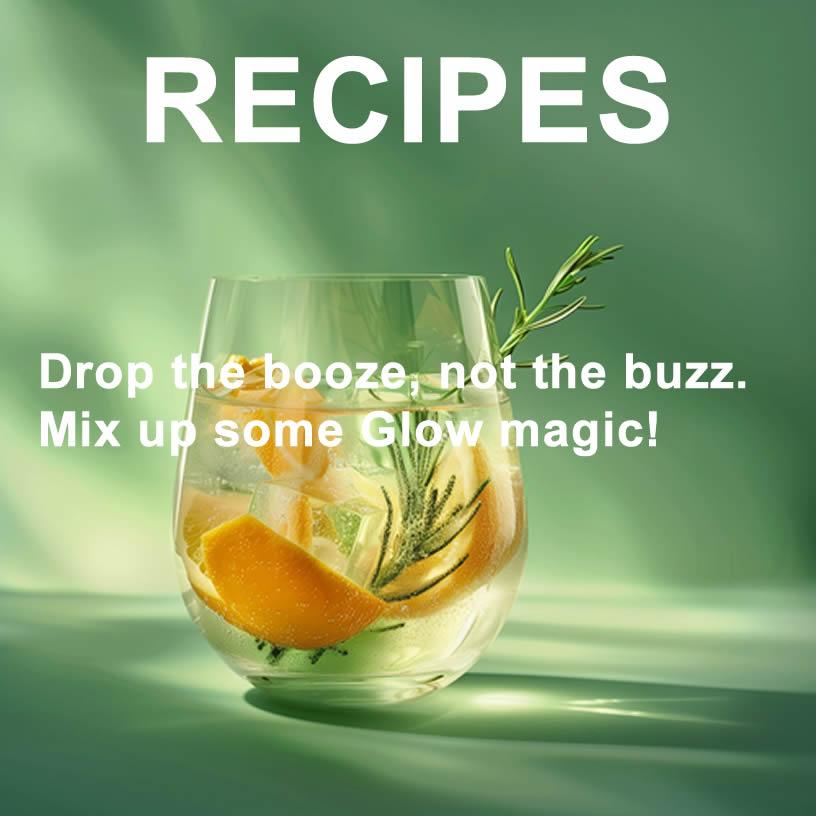

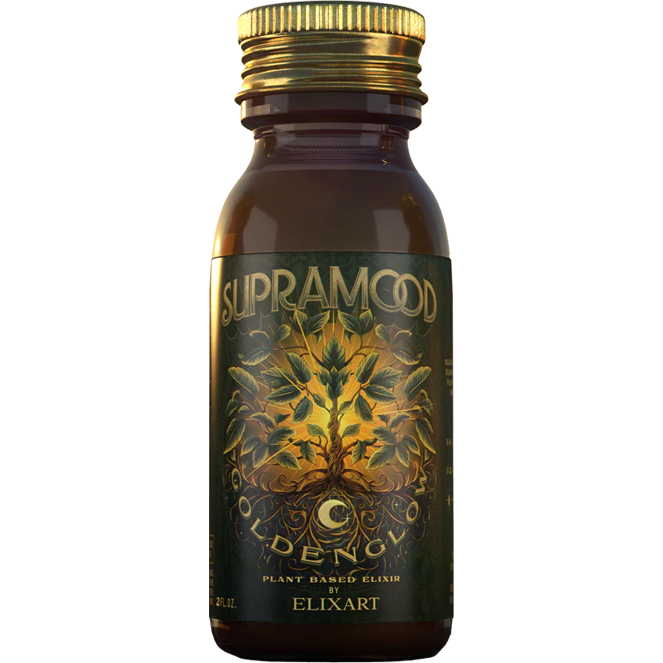
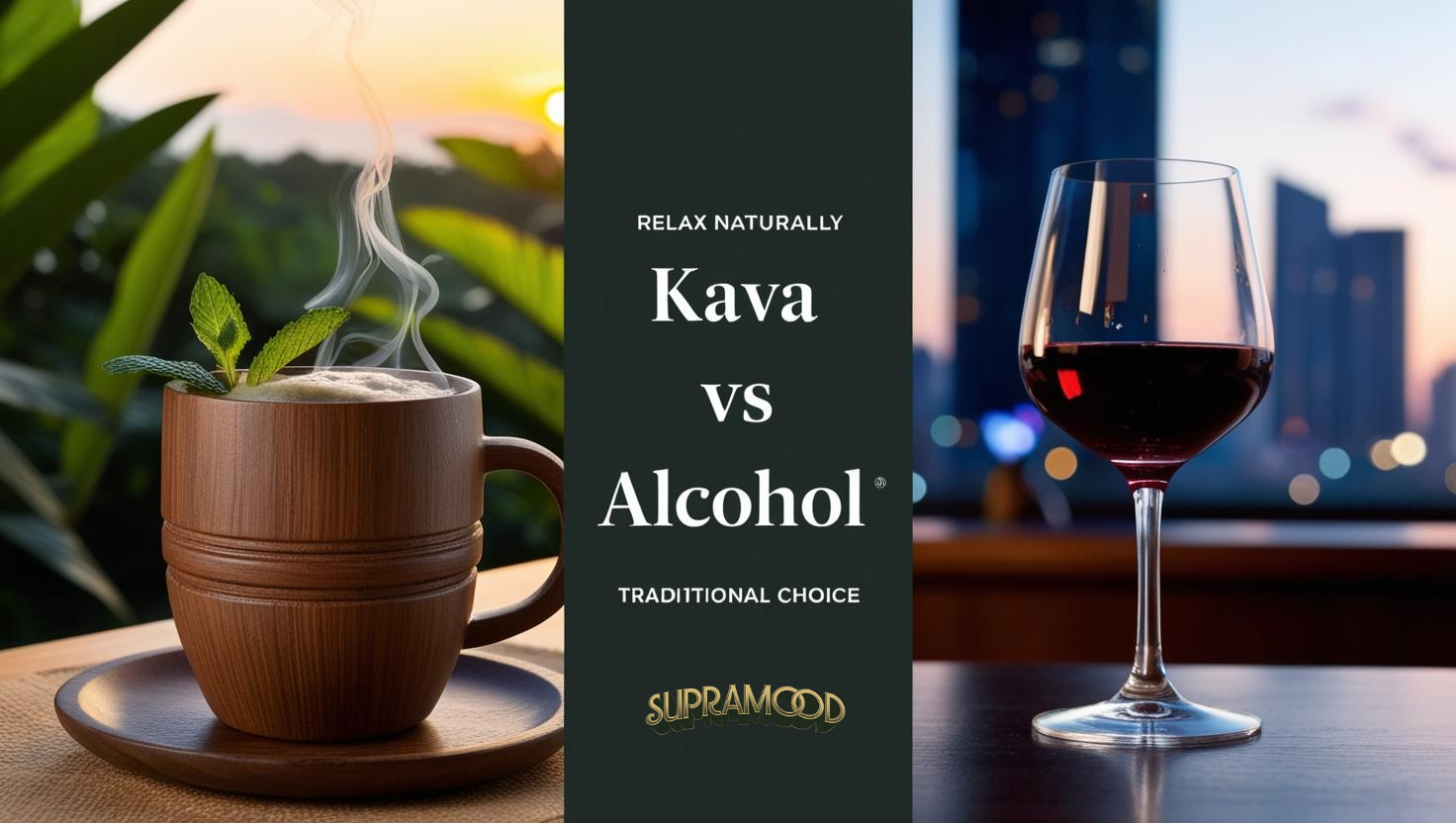
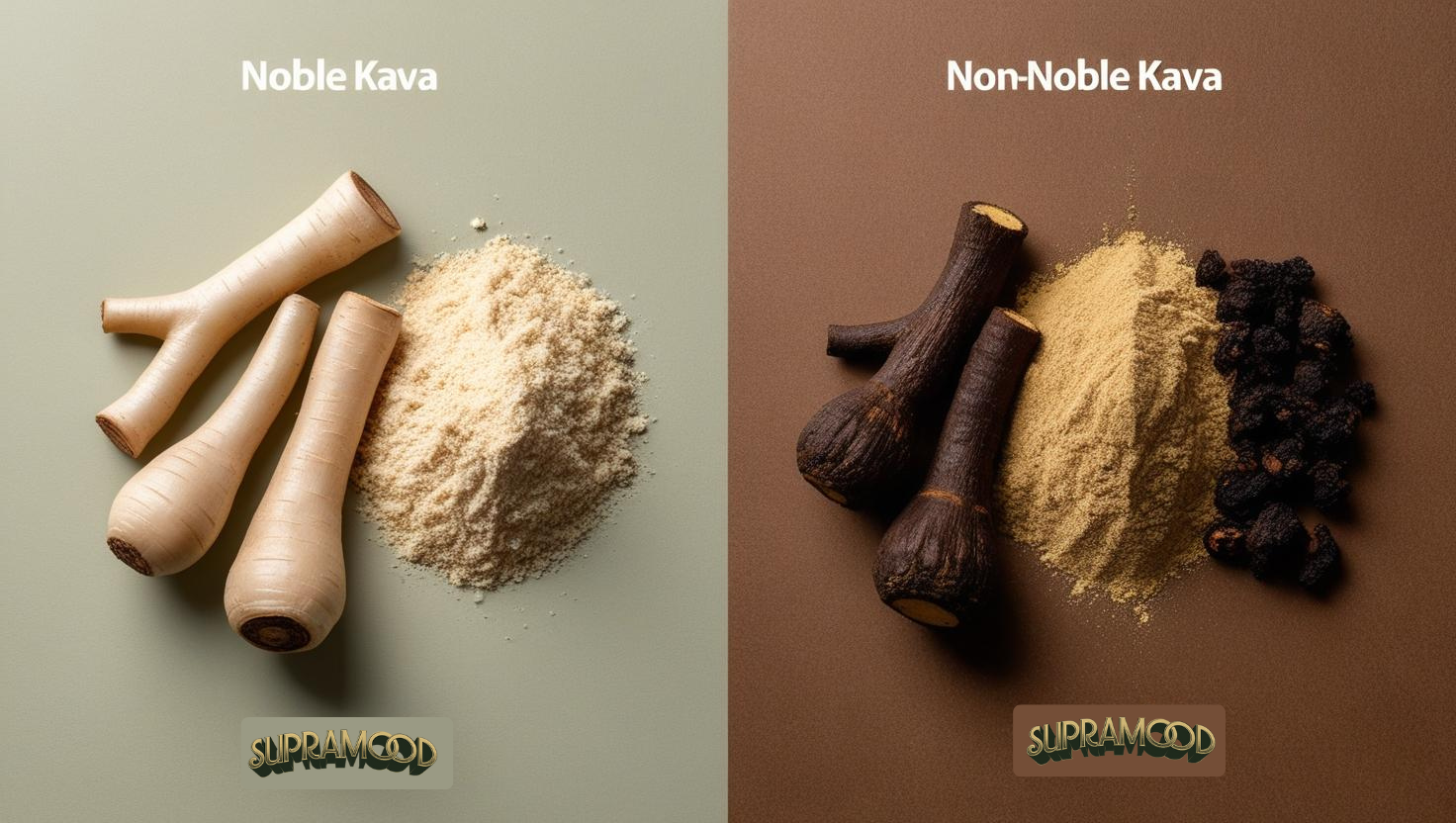
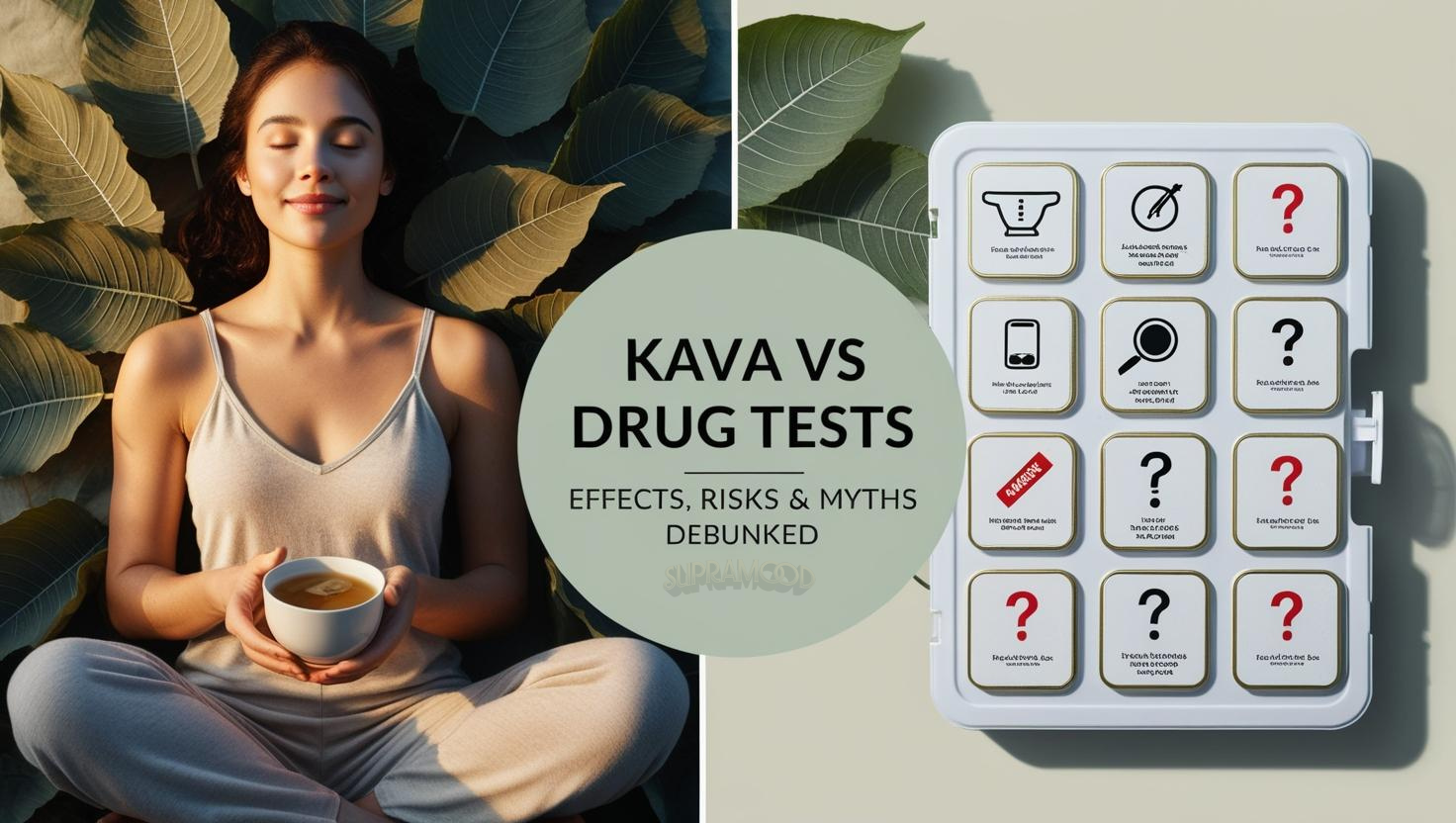
Leave a comment
All comments are moderated before being published.
This site is protected by hCaptcha and the hCaptcha Privacy Policy and Terms of Service apply.